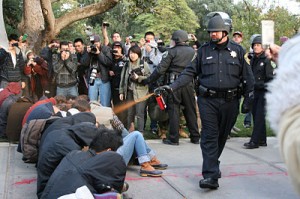 I have very little use for “Occupy Wall Street” and its far-flung imitators, but even so I found the image somewhat disturbing. A UC-Davis police officer seems to be strolling along, casually emptying a can of pepper spray toward the heads of protestors seated on the ground.
I have very little use for “Occupy Wall Street” and its far-flung imitators, but even so I found the image somewhat disturbing. A UC-Davis police officer seems to be strolling along, casually emptying a can of pepper spray toward the heads of protestors seated on the ground.
Then I mentally shrugged.  Unfortunate optics, but no real harm done. It may have been excessive, but no matter how the police break up a demonstration, they will be criticized for the inevitable injuries and indignities. A YouTube video helps by putting the pepper spray in the context of a broader and more calibrated use of force.
Obviously, the left has a different storyline to offer. If you Google “pepper spray” + “Kent State” you’ll get nearly half a million results.
To be fair, nobody seems to be claiming that the UC Davis incident is “another Kent State.” (Googling “pepper spray” + “another Kent State” yields 3,970 results, but the top result says “another Kent State is unlikely”, and other results express fears of “another Kent State.”)
The 1970 Kent State shootings may have been the tipping point of the battle for public support of the Vietnam War. The episode inspired CSN&Y’s haunting refrain of “four dead in O-hi-o,” and was captured in an iconic photo of a 14-year-old runaway screaming over the body of a dead protester.
But the differences between the two incidents only start with the fact that nobody died at UC Davis. Taranto, who evokes “Hoovervilles” by consistently referring to the OWS protestors as “Obamavillians,” breaks it down:
Let’s say, heaven forbid, that the Obamavillians get their “Kent State moment”–a violent climax serving as the final tipping point that convinces the majority of Americans to oppose . . . well, you see the problem. To oppose what exactly? Private property? Public order? Personal hygiene?
Exactly right. To belabor his point: During the Vietnam War, there was a straightforward, easily defined, highly achievable course of action that would meet the demands of the protestors. All the government had to do was abandon our South Vietnamese allies and get out of Southeast Asia. Rightly or wrongly (and I tend to think it was the least-bad option), the government eventually did precisely that.
But what can be done to satisfy OWS? Raise taxes on “the 1 percent”? Fine, but even if you assume confiscatory tax rates and no change of behavior by taxpayers, taxing “the rich” won’t do much toward closing the budget deficit — and it certainly won’t create jobs. And no level of taxation will ever be high enough to satisfy the tax-the-rich impulse.
I haven’t blogged much about the ongoing protests; my entire OWS oeuvre apparently consists of a passing swipe at “the aimless juvenile antics of the Occupy Wall Street crowd” in a post on an unrelated topic. The movement hasn’t interested me — I’ve always thought its enemy was capitalism itself. I’m a big fan of capitalism, and OWS poses no real threat to it.
My priest, a thoughtful liberal who has tugged me back before from some of my more conservative leanings, gave me a new way to think about OWS in his Sunday sermon. After carefully stating that he was taking no position on the specific messages and tactics of the movement, he said that Occupy Wall Street can be seen as “an expression of pain.”  His point, which I hope I am capturing adequately, is that the pain is real and needs to be acknowledged.
Fair enough. The classic right-wing response to demonstrators is to snarl “get a job” — a phrase that bristles with cruel irony during a period when it sometimes feels like 9% unemployment is settling in as the new normal. I have my own riches-to-rags story, although both “riches” and “rags” are exaggerations. I work at a church, making about what I made in 1985 — and I thank God every day that I have a job at all, let alone one that provides the privilege of laboring for a worthy organization.
I do think the OWS crowd would do well to channel its anger in more productive ways. Say what you will about the Tea Party, but it certainly has built something out of its initial expressions of pain: one out of every four Republican members of the House now self-identifies as a member of the Tea Party Caucus. Somehow I don’t expect there will ever be an OWS coalition in Congress.
(Unattributed photo snatched from Eschaton.)
